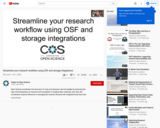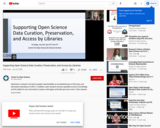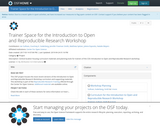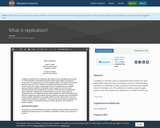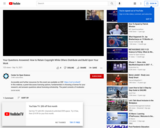Openness in research can lead to greater reproducibility, an accelerated pace of discovery, and decreased redundancy of effort. In addition, open research ensures equitable access to knowledge and the ability for any community to assess, interrogate, and build upon prior work. It also requires open infrastructure and distributed access; but few institutions can provide all of these services alone. Providing a trustworthy network for perpetual availability of research data is critical to ensuring reproducibility, transparency, and ongoing inquiry.
Increased attention on the importance of open research and data sharing has led to a proliferation of platforms to store data, materials, etc., with limited technical integration. This can hinder data sharing, but also complicate coordination with local library expertise and services, thus hampering curation and long-term stewardship.
For example, the open source OSF enables researchers to directly create and manage research projects and integrates with other tools researchers use (Google Drive, Dropbox, Box, etc.), but lacks the ability to archive that material locally at a researcher’s institution. Long-term stewardship and preservation requires multiple copies of data archived in different locations, and creating archives seamlessly would be ideal.
COS and IA are working together to address these preservation and stewardship challenges by providing open, cooperative infrastructure to ensure long-term access and connection to research data, and by supporting and promoting adoption of open science practices to enhance research reproducibility as well as data sharing and reuse.
In this webinar, attendees will learn about both the technical and practical aspects of this collaborative project connecting the researcher tool OSF and the preservation system of Internet Archive. We demonstrate how researchers can improve the openness and reproducibility of their research through preregistration, and how those preregistrations are preserved with Internet Archive. We answer questions and explore use cases for how this powerful workflow can support library curation and stewardship of open research.

